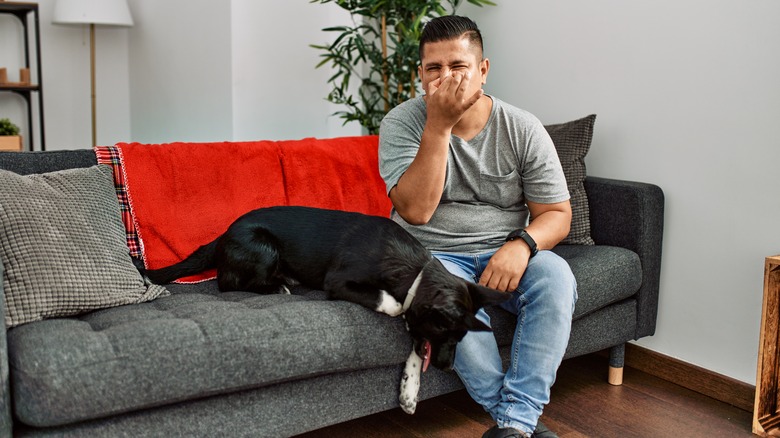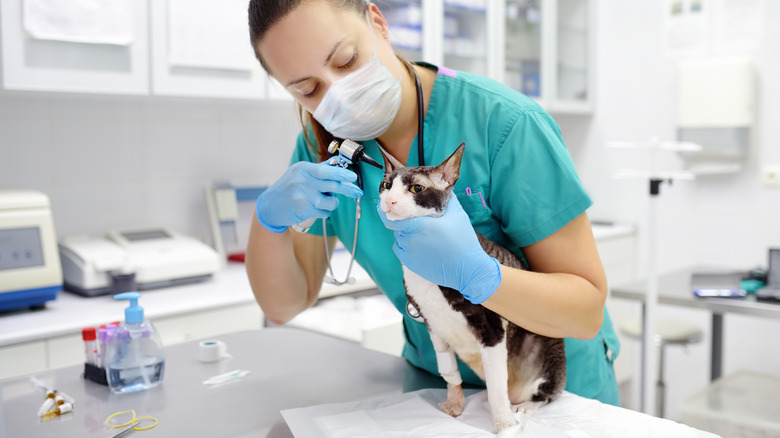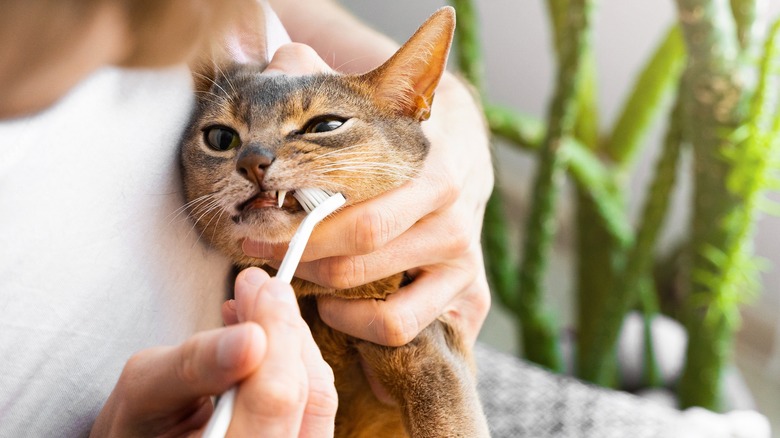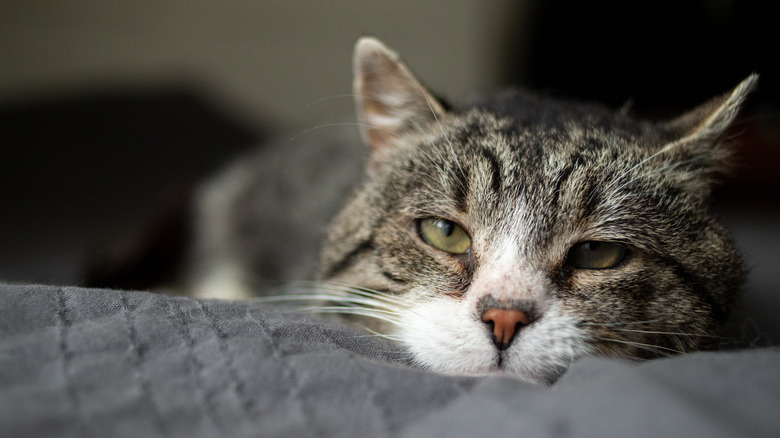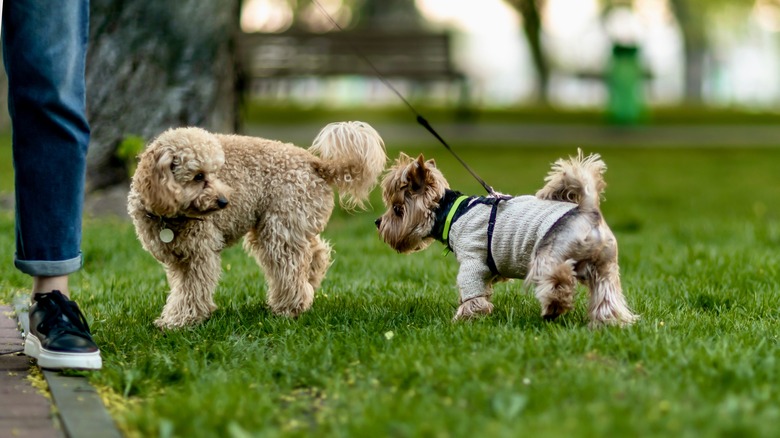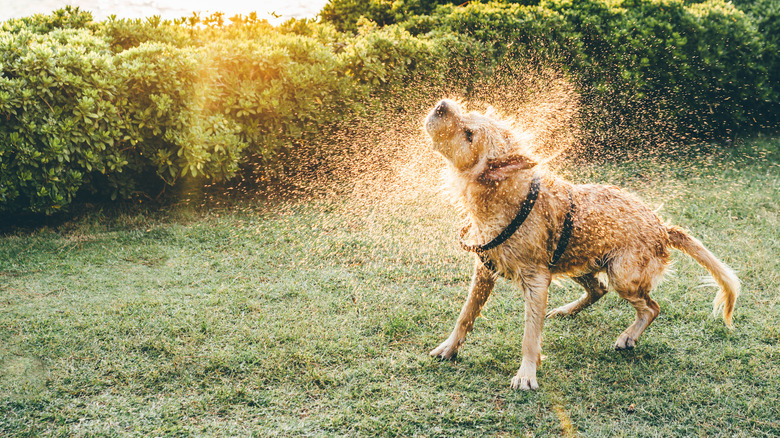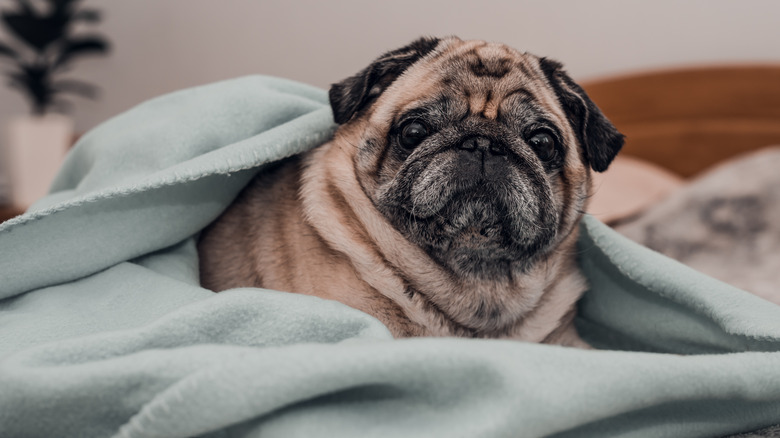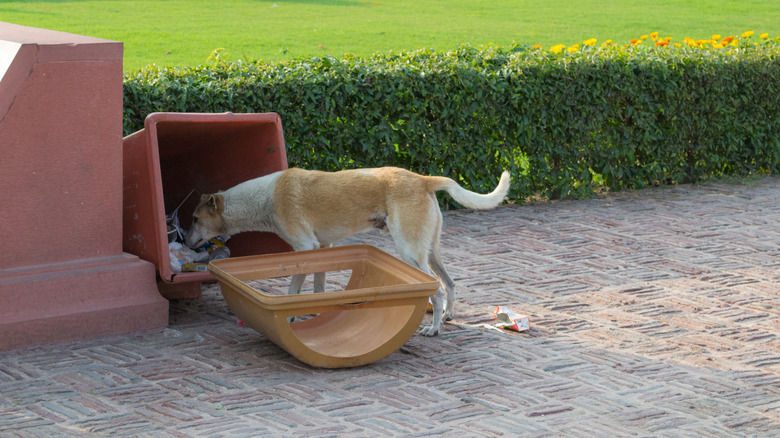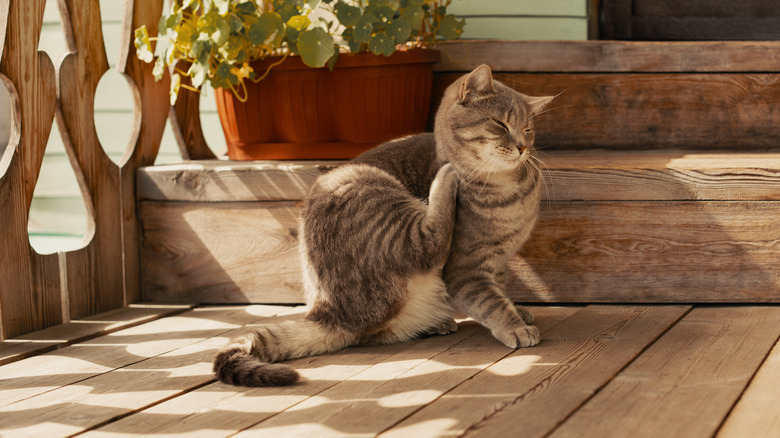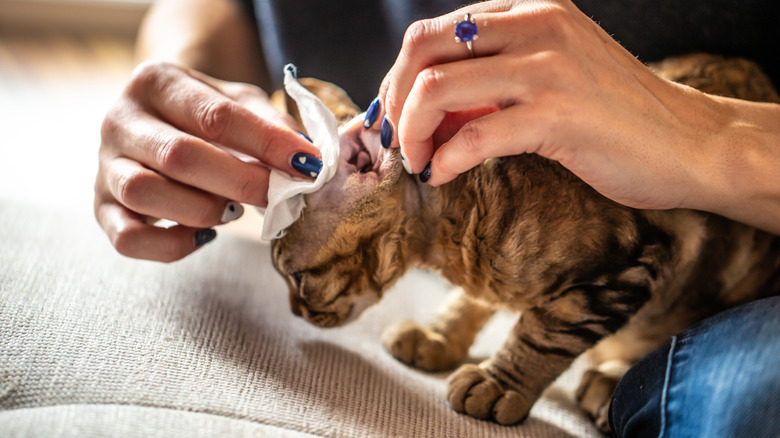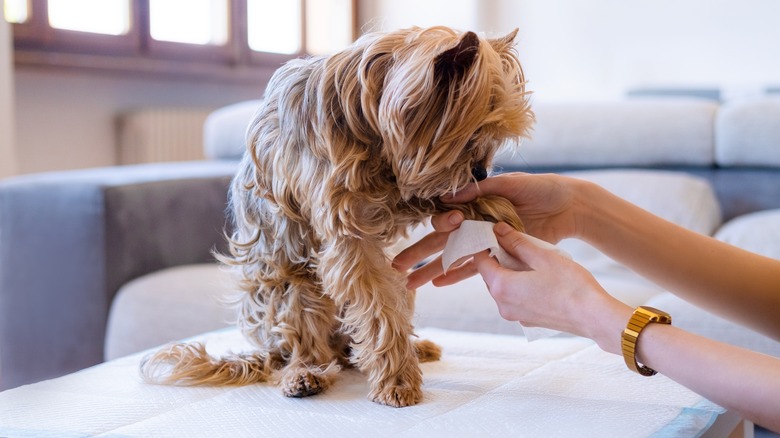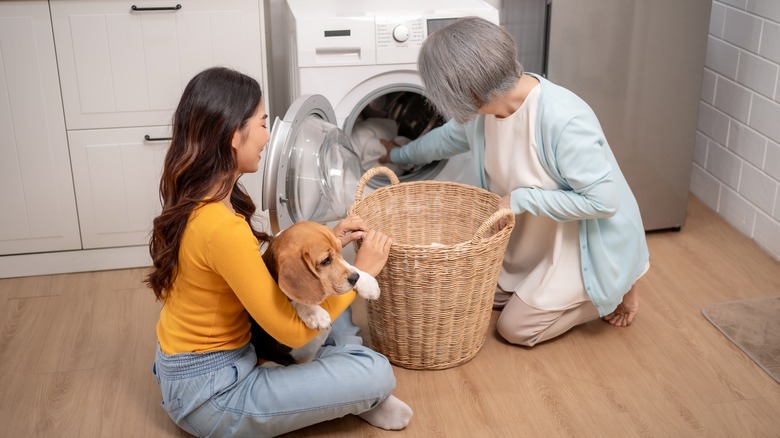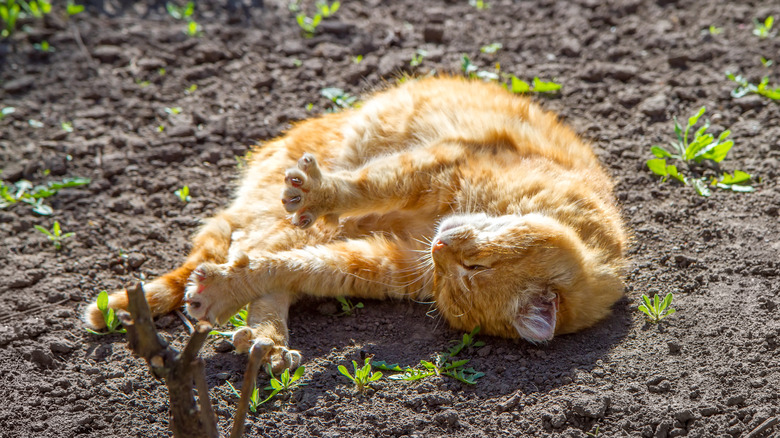Things You Don't Realize Are Making Your Pet Smell Bad
You know your pet's smell better than anyone else, so when it changes from fresh and familiar to unpleasant, it should raise a red flag. While the cause of the bad smell isn't always obvious, stinky breath, skin, gas, ears, and bottoms may indicate a range of problems. Some odor sources are easy to spot, such as rolling around in the mud all day or napping on a pile of soiled laundry; others may be hidden. In many cases, a smelly pet serves as a reminder to up your care game by brushing their coats more regularly, monitoring their ears, and spot-cleaning them after playtime outside.
Many culprits can cause your pet to stink, from ear infections and dental problems to allergies and dirty bedding. In some cases, bad odors can be a sign of more severe health concerns, such as kidney disease or urinary issues. Though that might sound like a reason for alarm, catching these problems early allows your pet to get the treatment they need to stop the situation from getting worse.
Ear infections
Although one wouldn't expect them to smell like roses, if your pet's ears have a sickeningly sweet stench that lingers in the air all day, they could have a bacterial or yeast infection. This is more likely to be the case if the smell is accompanied by other symptoms, like discharge, redness, head shaking, and scratching. In addition to these signs, cats may display balance issues or disorientation. Dogs with long, floppy, hairy ears or those who spend a lot of time in the water are more prone to ear infections. If your canine has very hairy ears, you can ask your groomer to trim around the area so that wax, dirt, and odors don't get trapped.
If you receive vet approval to regularly clean excessive wax or dirt out of your pet's ears, go ahead. However, you shouldn't do this if you notice signs of an infection, as you could make the situation worse or cause more pain for your beloved companion. Before touching your pet's ears, take them to the vet and ask about the different types of antibiotics available for dog and cat ear infections. Also, request that they explain how to best care for your pet's ears in general.
Dental problems
Smelly breath can be a sign of several health issues, like diabetes and kidney disease, but dental problems are the most common cause. Without regular teeth brushing, particles from whatever your pet has licked or eaten can get trapped in their gums, creating decay that can lead to bad breath. It can also cause bacteria to build up in the mouth, which can lead to inflamed gums and other issues like periodontal disease. The best way to combat this is by brushing your pet's teeth at least three times a week, though some experts believe doing it every morning and night alongside your own routine is ideal.
Different animals will require different dental cleaning tools. You can use a special brush or cotton swab to clean a cat's teeth, but should only use a dog toothbrush on canines with pet-friendly toothpaste. Ask your vet to recommend toys that can help clean your dog's teeth naturally. You should take your pet for professional teeth cleanings every one to two years, depending on the breed and their oral health. Smaller animals, like rodents, may not require teeth brushing at all, but can maintain good oral health via chew toys available and eating a healthy diet.
Sometimes, your pet's mouth may smell because something is trapped inside, like a splinter from a stick. This can cause an infection; if your pet allows it, examine the teeth, cheeks, area under their tongue, and the roof of their mouth for signs of redness or an abscess. If your pet has bad breath even without these signs, you should still get them examined by their vet.
Kidney disease
One of the most important jobs the kidneys have is cleaning waste, such as urea, out of the bloodstream. When kidneys start to fail, the waste builds up, and it makes your pet's breath stink. Due to the high amount of urea in the bloodstream, their breath will smell like ammonia. Although kidney disease causes bad breath, dental disease can be a cause of kidney disease. However, there are several acute and chronic causes of kidney disease, which your vet will need to determine through testing.
Other than bad breath, kidney disease can lead to a loss of appetite or picky eating that results in weight loss, decreased energy, vomiting, diarrhea, and dehydration (even though your pet will want to drink a lot more water). Pets with kidney disease need medical care, not home remedies that aren't vet-approved. Prolonging proper treatment can cause serious damage to your pet's organs and be life-threatening. Ask your vet questions about your dog or cat's kidney disease stage, treatment options, and prognosis. Depending on how bad their condition is, they may need medication, dialysis, and other treatments that only your vet can provide.
Infected anal sacs
Anal sacs naturally secrete a unique smell for other pets to pick up on, which is why pets greet each other by sniffing this area. Additionally, both cats and dogs empty their anal sacs when they're scared or pooping. Although the normal scent of anal gland secretions isn't exactly pleasant, if the smell is strong (and fishy) enough to get your attention, it could be a sign the anal sacs are infected.
Other signs of infected anal sacs are swelling and pus, or if your pet starts scooting on the ground, excessively licking their bottom, or struggles to poop. If you notice these behaviors, it's time to bring them to a vet. To sort out the infection and prevent an abscess from forming, your vet will likely prescribe antibiotics. They may also manually express the sacs, which should sort out the bad odor.
Most pets won't ever have problems with their anal sacs, but if yours regularly develops issues, you may need to express their anal sacs manually and consider altering their diet. If this provides little improvement, your vet may suggest surgically removing the sacs.
Wet fur or hair
Even with regular grooming, a wet pet can smell unpleasant. As pet owners, we all know this smell because it's usually trapped inside our cars with us on the drive home from a day at the beach or lake. This happens whenever your pet goes for a swim because the microorganisms, dirt, and natural oils that live on their skin, fur, or hair release smelly odors into the air through moisture evaporation.
You may also notice that one pet smells worse than another after a dip in the pool. This may be because one has wrinkles and the other does not. In the former case, more microorganisms, oil, dirt, and moisture may get trapped between their skin folds and smell worse. To prevent odors, thoroughly dry your pet's hair or fur with a pet blow dryer after a bath or swim. Regularly brushing through their coats will also reduce odors because hair and fur trap moisture and dirt.
Skin fold dermatitis
Obese pets and wrinkly breeds, such as pugs, are at risk for skin fold dermatitis. Between their folds are warm, moist environments where dirt, saliva, and oils get trapped, and microorganisms, such as bacteria and yeast, thrive. If the skin under these folds isn't cleaned and dried regularly, they will become inflamed, infected, and smelly. Once an infection develops, you'll need to prevent your pet from scratching or itching the infected areas and treat it with medication from your vet.
It's important to clean between your pet's folds every day to avoid infection, or even more frequently if you notice dirt or trapped food in the wrinkles around their face. Daily cleaning of your pet's folds can be done by using wet wipes from your vet. You'll need to lift each fold, wipe away any moisture or dirt, and then dry the area with a cotton ball. When bathing your pet, use a mild shampoo that is gentle and hydrating to their skin, wash between their folds, and then rinse them well before drying them thoroughly with a microfiber towel.
Eating the wrong foods
Pets who eat things they shouldn't, such as feces, cigarettes, or spoiled food, will have bad breath. Although you may not have seen what they ate, their breath will be a giveaway, so brush their teeth, use pet wipes to clean them up, give them dental chews, and restrict access to areas where they could find bad things to snack on. If they're eating spoiled food from your trash can, get one with a secure lid that they can't open. If they have a habit of eating poop, pick it up from your yard more regularly or move your cat's litter box to an area your dog can't access. Where applicable, chat with your vet about why your cat is eating litter or your dog is eating poop because it could be a sign of a dietary deficiency.
Sometimes bad food, including table scraps, is hard to digest and will cause gas in your pet, making them smell bad. If your pet struggles with a gurgling stomach, flatulence, and burping, take a look at their diet and avoid hard to digest ingredients. Your vet can help you with this process and recommend a diet more appropriate for your pet. However, gas can also be a symptom of irritable bowel syndrome (IBS), so your vet will run tests to determine what the cause.
Allergies
Like humans, allergies in pets are pretty common. Allergic reactions occur when an allergen enters your pet's body, and their sensitive immune system sees it as a threat and attacks it. In humans, allergic reactions to dust and pollen will usually include a congested nose and itchy eyes, while in pets, they'll typically manifest as skin problems.
Allergies that cause your pet to become itchy and scratch excessively can quickly turn into yeast or bacterial infections, which can cause secretions that smell bad. Cats often experience these issues on their heads and necks, while dogs can also have it on their paws and stomachs. However, other areas can be affected, too.
Environmental, food, and flea allergies can cause excessive itching. There isn't much you can do to help your pet on your own, and your vet will need to do allergy testing to determine what your pet is allergic to. Pet's who are allergic to certain ingredients in their diets will need to transition to a special diet. Flea treatments, adding air purifiers in your home to reduce allergens in the air, medicated shampoos, and supplements can help pets with other allergic causes. Pets with skin infections will need antibiotics or antifungal medication to clear them up.
Urinary issues
If your pet smells like fish near their rear end but their anal sacs are not impacted or infected, the smell could be coming from their genital area. If too much bacteria gets into the bladder from the urethra, a UTI can develop. Although a pet's genitals are often in contact with a lot of bacteria from dirt, saliva, and poop, their body usually does a great job at fighting any bacteria that manage to enter the urethra. However, sometimes, when their immune system is weak from illness or old age, bacteria manage to move up the urethra and cause an infection.
Although UTIs are more common in female pets because their urethra is shorter, males can also get them. Their urine will smell fishy because of the high amount of bacteria in their bladder. However, UTIs don't only cause smelly urine; they can also result in fever, lethargy, pain, blood in the urine, vomiting, and a lack of appetite. If your vet can treat your pet early, the UTI should resolve quickly without any issues. UTIs are uncomfortable for your pet, and leaving them can cause complications.
Ear wax buildup
Certain breeds, pets that swim, and those with allergies tend to produce more earwax than their ears need. The production of wax is important to protect your pet's ears and keep them clean, but overproduction can cause issues for your pet if nothing is done about it. Thankfully, the solution is simple.
To clean and remove the excess wax from your pet's ears, you'll need to get a special ear cleaner from your vet, which you'll squirt into your pet's ear canal before massaging the base of their ear. After about 30 seconds, you can clean around the ear with a cotton ball. Let your pet shake their head to remove any leftover gunk.
When there is too much ear wax in your pet's ear, you might smell a bit of an odor coming from the area. However, cleaning the ears will resolve the problem before your pet is even bothered by it. However, allowing the wax to build up can lead to pain or an ear infection. It's normal for your cat or dog to have a bit of wax, but consult your vet if you think they have an excessive amount. Misjudging the situation and cleaning normal ears can change the pH and make them susceptible to infection.
Paw infections
If you sniff your pet's paws, they may smell yeasty (or like corn chips) — a scent some people don't like. As a pet owner, you'll have to get used to this mild odor because it's normal. Paws contain bacteria and fungi from walking through grass, stepping into poop and mud, and standing in puddles of dirty water. They also don't get much air moving between their smelly, warm toes, which is ideal for bacteria to live.
Bacteria may multiply, and a cat or dog paw pad infection can develop for many reasons. If an infection occurs, your pet's paws will start smelling like moldy cheese. Your pet can't tell you what's wrong via words, so you need to monitor for unusual smells and behaviors, like limping or excessive licking, and get your pet the care they need.
Clean infected paws with water and disinfectant, and chat with your vet about treatment. You can prevent future paw infections by trimming long hair around their paw and drying them thoroughly with a pet hair dryer after a bath. You can also keep pet wet wipes around to clean their dirty paws after they've played outside.
Infrequent grooming
Pets get dirty, and odors can get trapped in their fur or hair, which is why frequent brushing and occasional baths are necessary to avoid a stinky pet. Although pets groom themselves, it isn't always enough, especially if they are older or ill and have mobility issues preventing them from reaching certain areas.
How often you should bathe your pet depends on several factors, such as skin health, coat length, and activity level, so discuss the frequency best suited for your situation with your vet. Generally, healthy cats only need a bath when they're visibly dirty, and healthy dogs should get bathed about once a month. Bathing your pet will freshen them up, remove dirt, hydrate the skin, and unclog skin pores.
However, keep in mind that bathing your pet too often will dry out their skin, which can cause skin problems. If you've recently bathed your pet and they still smell off, you can sprinkle baking soda into their coat because it is an effective and natural odor-neutralizer. Regularly brushing your pet's coat, especially if it is long and thick, will also reduce odors as the air moves through it. It is necessary to keep their skin and hair healthy and reduce shedding around your home.
Not washing your pet's bedding regularly
While trying to find the source of your pet's smell, you might be overlooking their dirty, stinky bedding. It doesn't matter how many times you bathe your pet; if you neglect to wash their bedding, they'll end up smelling like it again once they settle in for a nap. Pets who have been out and about all day bring everything they've rolled and walked in back to their beds. They also shed their hair and natural oils over their bedding, as well as fleas and other parasites and bacteria that may have climbed onto their coats and paws during their time outside.
Thankfully, washing your pet's bedding can be as quick and easy as washing your own, and only needs to be done about once a week. Put all their blankets, towels, pillow covers, and bed covers into your washer and use pet-friendly laundry detergent. Run it on a hot cycle to kill germs and bacteria, and hang it out to dry naturally, if possible.
Their environment
If your pet spends a lot of time outdoors, they're likely going to come back inside smelling like the places they've been and whatever they've rolled or wandered through. Some days they may smell like flowers, while other days they could stink of poop. Although experts aren't completely certain as to why dogs in particular enjoy rolling into smelly stuff, some believe it's an act of protection, as it masks their own scent from others. Keep some pet wet wipes on hand for a quick, waterless clean up, or sprinkle baking soda into their coat to neutralize the smell.
Your pet may also encounter other animals in their environment, such as skunks. These black-and-white creatures spray terrible odors at people or animals they feel threatened by. Unfortunately, it's difficult to remove the smell from your pet's coat without using a de-skunking shampoo, but you can also make it at home with a few common household products. Your pet should be fine if they get skunked, but if it gets into their eyes, they may swell, redden, and experience temporary blindness. Vomiting, drooling, and respiratory issues are other symptoms to watch out for.
